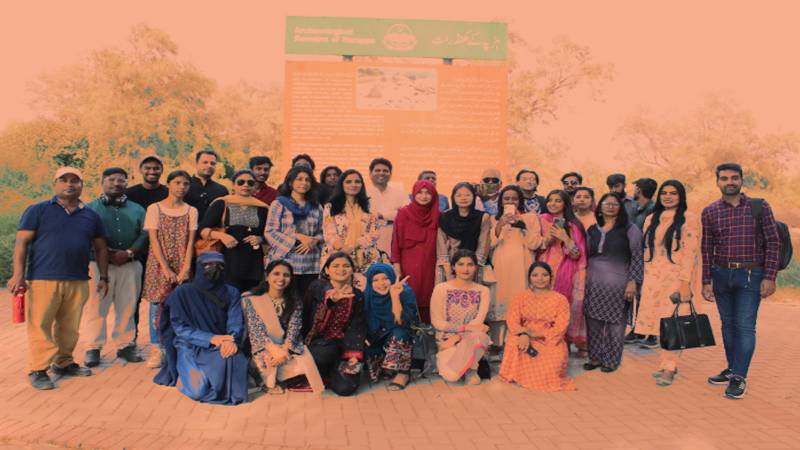
Twenty-eight participants, most of them students, visited the Harappa Museum and the archaeological site often called the Indus Valley civilization on Saturday. The exposure visit was organized by the Ecumenical Commission for Human Development (ECHD) a day after a workshop on “Developing a Culture of Peace and Harmony” held at a local hotel in Lahore on Friday, jointly by the ECHD and Christian Study Center.
During the visit, the youngsters made vlogs, learned about the history of artifacts, and enjoyed folk songs by local musicians at a shrine.
The tour was held a day after the Lahore workshop, where the speakers urged participants to become agents of change, peace, and harmony among different faiths and religions to enhance mutual understanding.
During the workshop, South Asia Partnership Pakistan Deputy Director Irfan Mufti explained the geo-political turmoil in Pakistan and its impact on marginalized communities.
“Politics is now infected with aggression. Fear and uncertainty are causing brain drain. The entire country is presently under mortgage. We are only exporting raw materials, sports goods, and surgical items,” he said.
“Only peace can attract foreign investment for economic growth and development. The state should invest in growth, unlock the power of religious traditions, and provide inspiration and guidance to young people to move towards non-violent attitudes.”
Muhammad Pervaiz, Program Manager of the Change organization, urged referring to history and culture to find a solution for the present crisis. “We used to share the festivities of Eid and Christmas, but the trend has declined,” he added.
Bishop Samuel Azariah, Director of the Christian Study Centre, urged using culture as a tool for peacebuilding and shared values.
“Religious institutes never tried to inject cultural values into their followers. We remain limited to following rituals and have stopped focusing on values that unite us and bring a sense of common ownership,” he said.
“Focusing on sports, food, festivals, and folk music can help bring change and revive the composite heritage,” he stated.
Haroon Gill, an academic, urged all to accept people as they are, with no shaming of their culture or traditions, their clothing, or even their bodies.
“Human dignity is supreme. Youth empowerment can influence a society where everyone is wearing masks. Trust can only be built in a favorable environment. Success is the culmination of decisions and actions. We need peace with each other and nature,” he stressed.
Areej Shafaqat, a student of BS Gender Studies, recited 'Naat' praising the Prophet Mohammed (Peace Be Upon Him) before lunch.
“This is the first time I experienced being a minority in a Christian majority group. I witnessed what happens when people of different religions come together,” said the 23-year-old.
For Yasir Javed, vice president of Sacred Heart Cathedral parish youth in Lahore, visiting the Harappa site was a life-changing experience.
“I was inspired by the Harappa Museum and the stories it told throughout history. It was a thrilling and learning experience to care for creation and the people in our surroundings,” he expressed.
Harappa is known to be a 4700-year-old city in the subcontinent that was discovered around 1920 in the eastern Punjab province and the southwest of the city of Sahiwal. It was discovered by Dayaram Sahani under the guidance of Sir John Marshal.

